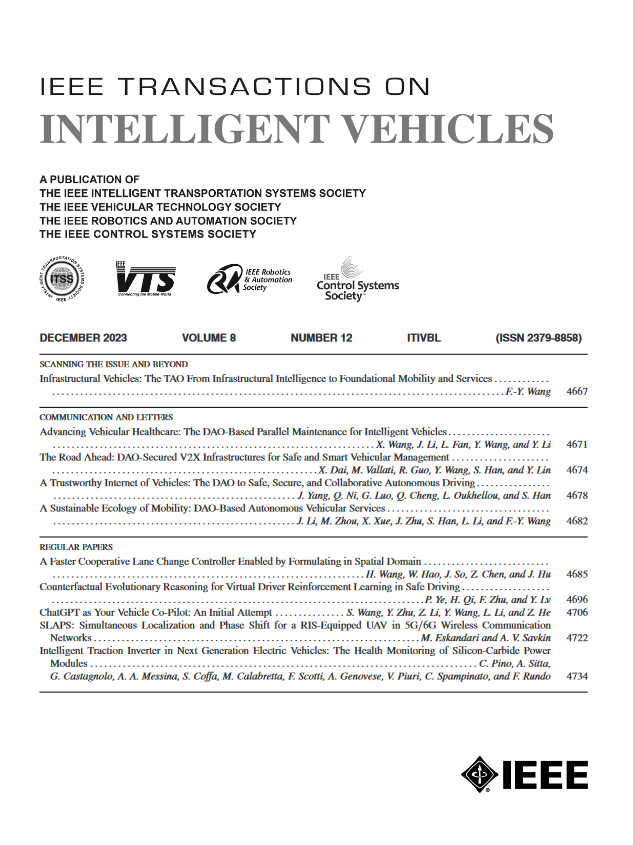Event-Triggered Position Scheduling Based Platooning Control Design for Automated Vehicles
IF 14
1区 工程技术
Q1 COMPUTER SCIENCE, ARTIFICIAL INTELLIGENCE
引用次数: 0
Abstract
This paper focuses on the design and implementation of a sampled-data controller for connected autonomous vehicle platoons operating in a predecessor-follower configuration. Due to the cost and reliability concerns associated with velocity and acceleration sensors, this study involves the development of an event-based sampled-data controller that relies solely on position measurements. Considering the limitations of velocity and acceleration sensors, a memory-based sampled-data controller is proposed that utilizes current and preceding position data information to approximate velocity and acceleration. To conserve communication resources, the controller incorporates a dynamic event-driven communication mechanism. In particular, event-driven communication thresholds are adaptively adjusted based on platooning errors between vehicles. This enhances resource utilization while maintaining control performance. In addition, determining the maximum allowable sampling period and event-triggered constraint parameters is crucial for reliable control performance. This is achieved by formulating and solving stability criteria for the closed-loop platoon error system using Lyapunov stability theory and the linear matrix inequality framework. Finally, comprehensive numerical simulations demonstrate the effectiveness of the proposed event-triggered control algorithm under the influence of some key factors, including triggering instants and unknown nonlinearity effects.基于事件触发位置调度的自动驾驶车辆队列控制设计
本文重点研究了一种采样数据控制器的设计和实现,该控制器适用于以前身-跟随配置运行的联网自动驾驶车辆队列。考虑到与速度和加速度传感器相关的成本和可靠性问题,本研究涉及到基于事件的采样数据控制器的开发,该控制器仅依赖于位置测量。考虑到速度和加速度传感器的局限性,提出了一种基于记忆的采样数据控制器,该控制器利用当前和先前的位置数据信息来近似速度和加速度。为了节约通信资源,控制器采用了动态事件驱动的通信机制。特别是,事件驱动的通信阈值是基于车辆之间的队列错误自适应调整的。这在保持控制性能的同时提高了资源利用率。此外,确定最大允许采样周期和事件触发约束参数对于可靠的控制性能至关重要。利用李雅普诺夫稳定性理论和线性矩阵不等式框架,建立并求解了闭环排误差系统的稳定性判据。最后,综合数值仿真验证了事件触发控制算法在触发时刻和未知非线性效应等关键因素影响下的有效性。
本文章由计算机程序翻译,如有差异,请以英文原文为准。
求助全文
约1分钟内获得全文
求助全文
来源期刊

IEEE Transactions on Intelligent Vehicles
Mathematics-Control and Optimization
CiteScore
12.10
自引率
13.40%
发文量
177
期刊介绍:
The IEEE Transactions on Intelligent Vehicles (T-IV) is a premier platform for publishing peer-reviewed articles that present innovative research concepts, application results, significant theoretical findings, and application case studies in the field of intelligent vehicles. With a particular emphasis on automated vehicles within roadway environments, T-IV aims to raise awareness of pressing research and application challenges.
Our focus is on providing critical information to the intelligent vehicle community, serving as a dissemination vehicle for IEEE ITS Society members and others interested in learning about the state-of-the-art developments and progress in research and applications related to intelligent vehicles. Join us in advancing knowledge and innovation in this dynamic field.
 求助内容:
求助内容: 应助结果提醒方式:
应助结果提醒方式:


